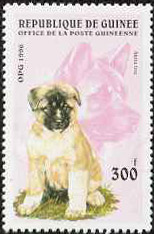
The Poodle
Poodles come in different colours and three sizes, Toy, Miniature and Standard. They were developed to retrieve in water, so could be classed as gundogs. The first Poodle to be developed was the largest, or Standard, with the two smaller varieties developed later, when the Poodle became more popular as a companion dog for ladies at court in France, from the 17th century, moving away from its original role as a hunting dog.Standard poodles especially can work well as gundogs, in their original role retrieving.
Poodles tend to stand out for the special qualities of their coat, which doesn't shed, and is trimmed instead. There are many varieties of clips, some of which are practical and comfortable for the dog. The traditional clip was intended to help the dog swim well in water, while providing some protection against the cold. Some clips can easily be mussed up on muddy walks. Whatever clip is chosen, these are dogs which like to do the things dogs do, like going out on walks and playing ball.
They are very good walking companions, because they usually get on well with other dogs, and don't annoy passers by. Poodles have also been used as guide dogs for blind people, and they perform well in agility and obedience competitions. They do need something to do, so if you have a show dog and want a perfect hairstyle, you will need to think of fun activities to keep your dog entertained in the run-up to the show when the coat could be damaged.
They are dogs that love being with their owners, and pay close attention to what their owners say. They can learn most canine skills you might want to teach them. Poodles have been circus performers not just because of their fancy coats, also because of their abilities to learn tricks.
Are they good with children? Mostly, yes, but some individuals have been affected by careless breeding due to the breed's popularity, which means that some lines are highly strung, and can be nervy and snappy. They have a tendency to be sensitive, in any case, and a little shy with strangers. This nervousness tends to affect Toy and Miniature Poodles rather than Standard Poodles, which tend to be calmer. It is well worth meeting the parents of any poodle puppy you are interested in, so you can check their temperaments.
Well-bred and well-socialized Poodles are excellent companions for children, and are very gentle and calm dogs. They aren't especially pushy, though they do like attention. The Toy Poodle is a little too small for very young children, who might want to pick up the dog roughly, but both the Toy and the Miniature are good dogs for children to take to training classes, because they are small enough for a child to manage easily, while a Standard could pull a child over.
Poodles do need regular grooming, and a clip every six weeks or so. They are often recommended for allergy sufferers because they don't shed, though whether they trigger allergies will depend on the individual humans and dogs. They can be quite barky, which means that they are good watchdogs. They bark less if they have enough exercise and entertainment.
Common health problems include eye trouble (progressive retinal atrophy or PRA, and cataracts), hip dysplasia, heart disease, Von Willebrand's disease, ear infections, skin disorders, allergies, hypothyroidism, epilepsy, and Legg Perthes. Luxating patella can affect Toy and Miniature Poodles, while Toy Poodles can feel the cold and may need a little coat in bad weather. Standard Poodles are also vulnerable to bloat and are more vulnerable to cancer than Miniature and Toy Poodles. Standard Poodles tend not to live quite as long as the smaller varieties, which are among the longest-lived of dog breeds, on average, though Standards still have above-average canine lifespans, similar to those of Labradors.
This book is an up-to-date, in-depth guide to poodles, which is both an excellent introduction for novices, and detailed enough to interest experienced owners. It gives a very clear idea of the delights of owning a Poodle, as well as providing advice on general care, such as health care, and grooming and training.



